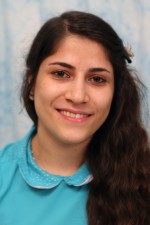Student Talks
Carnegie Mellon University
Sparse and Dense Methods for Underwater Localization and Mapping with Imaging Sonar
Abstract: Imaging sonars have been used for a variety of tasks geared towards increasing autonomy of underwater vehicles: image registration and mosaicing, vehicle localization, object recognition, mapping, and path planning, to name a few. However, the complexity of the image formation has led many algorithms to make the restrictive assumption that the scene geometry is [...]
Carnegie Mellon University
Deep Interpretable Non-rigid Structure from Motion
Abstract: Current non-rigid structure from motion (NRSfM) algorithms are limited with respect to: (i) the number of images, and (ii) the type of shape variability they can handle. This has hampered the practical utility of NRSfM for many applications within vision. Deep Neural Networks (DNNs) are an obvious candidate to help with such issue. However, [...]
Carnegie Mellon University
Robot Task Execution by Policy Adaptation and Switching Among Multiple Tasks
Abstract: While mobile robots reliably perform service tasks by accurately localizing and safely navigating while avoiding obstacles, they do not respond in any other way to their surroundings. In this work, we introduce two methods that enable the robots to be more responsive to their environment, including humans and other robots. The first algorithm enables [...]
Carnegie Mellon University
Vision with Small Baselines
Abstract: Portable camera sensor systems are becoming more and more popular in computer vision applications such as autonomous driving, virtual reality, robotics manipulation and surveillance, due to the decreasing expense and size of RGB camera. Despite the compactness and portability of the small baseline vision systems, it is well-known that the uncertainty in range finding [...]
Carnegie Mellon University
Machine Imagination: Data-driven User Controllable Visual Content Creation
Abstract: Humans have the remarkable ability to create visual worlds far beyond what could be seen by human eye, including inferring the state of unobserved, imagining the unknown, and thinking about diverse possibilities about what lies in the future. Machines lack this inquisitive ability despite the current revolution in machine learning and computer vision. We [...]
Carnegie Mellon University
Persistent Multi-Robot Mapping in an Uncertain Environment
Abstract: We present a system that addresses the challenge of concurrently mapping, scheduling, and deploying a team of energy-constrained robots to persistently cover an unknown and potentially dynamic environment. This system can passively maintain an accurate representation of occupied space, allowing robots reliable access for monitoring, study, or search and rescue. Current state-of-the-art algorithms only [...]
Carnegie Mellon University
Learning with Clusters
Abstract: Clustering, the problem of grouping similar data, has been extensively studied since at least the 1950's. As machine learning becomes more prominent, clustering has evolved from primarily a data analysis tool into an integrated component of complex robotic and machine learning systems, including those involving dimensionality reduction, anomaly detection, network analysis, image segmentation and [...]
Carnegie Mellon University
Spatiotemporal Understanding of People Using Scenes, Objects, and Poses
Abstract: Humans are arguably one of the most important entities that AI systems would need to understand to be useful and ubiquitous. From autonomous cars observing pedestrians to assistive robots helping the elderly, a large part of this understanding is focused on recognizing human actions, and potentially, their intentions. Humans themselves are quite good at [...]
Carnegie Mellon University
Sensing, Measuring, and Modeling Social Signals in Nonverbal Communication
Abstract: Humans convey their thoughts, emotions, and intentions through a concert of social displays: voice, facial expressions, hand gestures, and body posture, collectively referred to as social signals. Despite advances in machine perception, machines are unable to discern the subtle and momentary nuances that carry so much of the information and context of human communication. [...]
Carnegie Mellon University
Optimal control of compliant bipedal gaits and their implementation on robot hardware
Abstract: Legged animals exhibit diverse locomotion patterns known as gaits, which are capable of robustly traversing terrains of variable grade, roughness, and compliance. Despite the success of legs in nature, wheeled solutions still dominate the field of robotics. State-of-the-art humanoid robots have not yet demonstrated locomotion behaviors that are as robust or varied as their [...]









